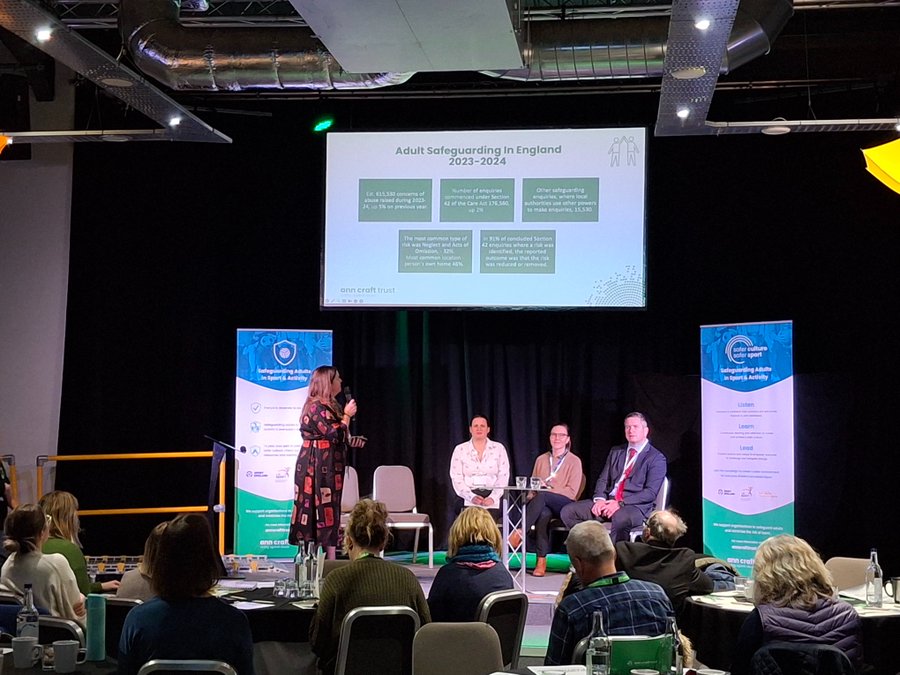
The Ann Craft Trust Sport and Activity Team ran a workshop at the 2024 Safeguarding Adults Conference in Nottingham.
This workshop explored why partnership work is so important in the prevention of abuse and harm. It also discussed what can happen if a person does not meet the statutory threshold for intervention, or if no further intervention takes place.
Our discussion covered best practice, the importance of partnerships, and the role of sport organisations to support the adult. On the panel were:
- Katy Downing, programme lead for the Get Up & Go programme at Northamptonshire Sport.
- Scott MacKechnie, chair of the Nottinghamshire Safeguarding Adults Board (NSAB).
- Vickie Merrick, Sport Welfare Officer at Northamptonshire Sport, and part of the newly formed national Sport Welfare Officer Network.
Learn more about the panellists, and about the background to our discussion, here.
Below are some brief summaries of some of the questions we posed to each of the panel members. Please note that these are not direct quotes!
Katy Downing – Tell us about the projects you work on, and how they benefit the individual.
Get Up & Go is part of a county-wide falls prevention programme supported by Public Health & the NHS. Instructors run independent strength and balance exercise classes for older adults. They are also perfect for anyone who has a fear of falling, who’s had a fall, or who’s at risk of falling.
Currently there are around 60 classes involving around 800 individuals a week, and it’s growing all the time. Building mobility means participants are less likely to injure themselves in falls or other accidents, but the benefits are much deeper than that. Every class is a community in its own right. People make friends, they arrange to meet outside of classes, call each other, they have parties etc.
So as well as building strength and mobility, the classes are also essential for preventing isolation. This in itself is a major part of good safeguarding. People look out for each other, so they’re more likely to spot when something goes wrong.
Vickie Merrick – Following the Whyte Review, how did you start making connections with other organisations?
One of the recommendations following the Whyte Review was the creation of a national network of Sport Welfare Officers to increase the capacity and effectiveness of local safeguarding networks.
I started working with bowls clubs in the counties, many of which have older members. I thought it would be a good idea to run a Get Up & Go workshop at some of the clubs, to improve members’ mobility and resilience, and to enable them to play bowls later into life.
So Katie and I met with the bowls alliance officer, who recommended some clubs where we could run the sessions. These workshops are helping bowls clubs grow their memberships, while also creating stronger communities who look out for each other. As Katie said, it’s an essential part of preventative safeguarding.
What benefits are you seeing with these partnerships?
Preventative safeguarding means ensuring measures are in place to promote adults’ safety and wellbeing to begin with. Thanks to these partnerships, formerly isolated people in communities are not so isolated anymore. So maybe further down the line they won’t need any statutory intervention should anything go wrong. All the things they need for protection will already be in place.
Scott MacKechnie – What does a safeguarding adults board do?
Our main role is to ensure that organisations’ safeguarding adults policies and procedures are effective. We’re very much focused on prevention, on ensuring that people know how to spot the signs of abuse, and that they know what actions to take should they suspect that something’s not right. There are lots of training resources on our site. We take national legislation and make it relevant for local concerns.
We also very much recognise that partnership working is vital in all aspects of adult safeguarding.
What do you do with referrals that do not meet section 42 threshold?
There were over 10,000 safeguarding adults referrals last year. Most of them came from the NHS, from care homes etc.
10-20% did not meet the section 42 criteria, which means that we do not need to make an intervention. But even if the case does not warrant intervention, people will still have concerns. So we will signpost these instances to third parties – support teams, charities etc. – to ensure they get the support they need in their communities.
